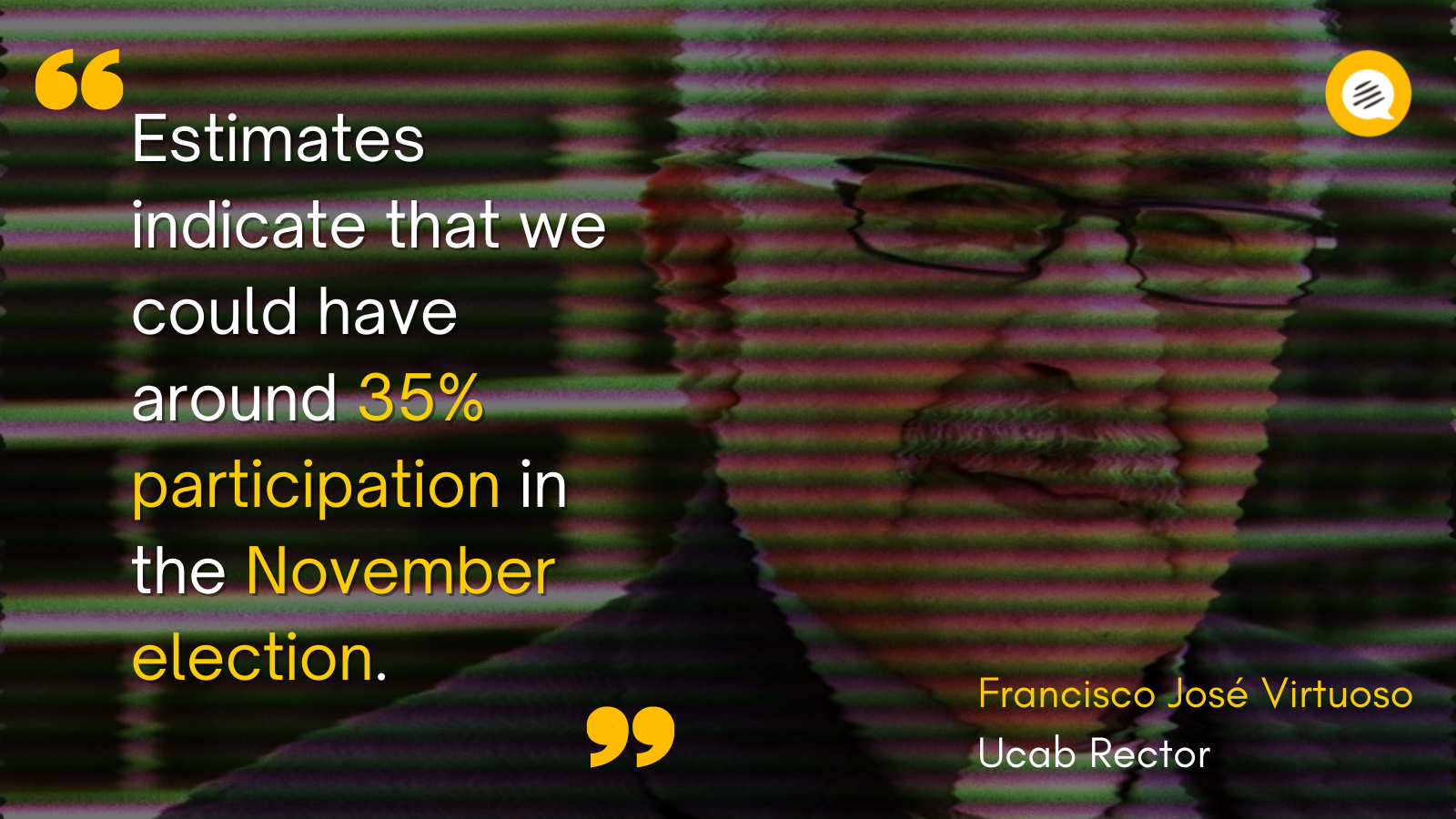Incomplete Electoral Conditions
Francisco José Virtuoso warned that the November elections could register a large abstention rate because it’s a process that doesn’t generate trust and the conditions aren’t good enough. UN High Commissioner for Refugees Michelle Bachelet asked the regime “to provide all conditions for free, fair, peaceful and independent elections. 81 healthcare workers died in June of COVID-19


Photo: Noticias Electorales
- On Thursday, UCAB rector Francisco José Virtuoso warned that the November elections could register a large abstention rate because it’s a process that doesn’t generate trust in citizens and the conditions aren’t good enough.
- Virtuoso is a political scientist and highlighted that there have been only a few improvements in the conditions but called them “incomplete”.
- About reactivating the MUD’s spot on the ballot, he said that political parties are under the regime’s control. He ruled out Maduro’s offer to eliminate protectors because the communal state structure directly threatens the functions of the state.
- Virtuoso thinks announcing the conditions came at the same time as “parallel movements that don’t generate confidence or hope”. He insisted we have to demand they don’t create a parallel state.
- He celebrated the opposition mobilizing for negotiations and their alignment with the international community, “but on Maduro’s side, we feel the silence. This is an asymmetrical negotiation process.”
- UN High Commissioner for Human Rights Michelle Bachelet asked the regime “to provide all conditions for free, fair, peaceful and independent elections.” She asked for access to information, broadening spaces for civil society, assigning enough resources to guarantee adequate detention conditions and access to justice, reforming judicial and security institutions, among other things.
- Bachelet reiterated all aspects of her previous reports and asked to prioritize a new legislative agenda that strengthens the protection of human rights. Bachelet emphasized that they still get reports about torture.
- NGO Acceso a la Justicia estimated that by imposing a CNE through the TSJ, the intervention of political parties, eliminating the Indigenous people’s secret and direct vote, and unconstitutional changes to the electoral system, the regime “definitively annules the right to vote in Venezuela in 2020.”
- They also mentioned the 145 rulings against the National Assembly elected in 2015. In their 2020 report, they highlight that the pandemic was used as an excuse to implement more repressive and arbitrary policies, limiting citizens’ fundamental rights.
- Carlos Ocariz called on democratic forces to choose unitary candidates for the elections in November.
- Avanzada Progresista’s secretary-general and member of the prêt-à-porter opposition Luis Augusto Romer assured that they are expecting to achieve unitary candidacies “within” the opposition sector.
- Diosdado Cabello offered a balance on the PSUV primaries: those who were seeking reelection and obtained less than 35% support won’t be able to run again.
- He said that the most voted were Cojedes governor Margot Godoy and Adolfo Pereira in Lara. He said he’s in favor of eliminating the protectors.
- ANC-imposed prosecutor general Tarek William Saab reported that three officers of the Instituto Nacional de Tierra (Inti) were detained in Guárico for corruption. Saab said that they processed 85 cases of weapons trafficking and 137 people tied to these crimes were arrested during the first semester of the year.
- Ilenia Medina, leader of political party Patria Para Todos, proposed holding an election to change the rules at Universidad Central de Venezuela and, among other things, holding a recall referendum on rector Cecilia García Arocha. She assured that the fire on Wednesday is García Arocha’s responsibility.
- 81 healthcare workers died in June of COVID-19. In addition, two doctors and one nurse died in the last two days in Zulia.
- Tinedo Guía, president of the National Journalist Guild, reported that at least 47 press workers have died of COVID-19. He demanded including the sector in a mass vaccination plan.
- Venezuela recibió received 42,000 ration packets from the WFP, after years of obstacles imposed by the government despite a complex humanitarian emergency.
- Maduro insisted that everyone should be back to school in person by October. Without explaining how or showing a plan, he expects that vaccination will improve between June and September, but warned that “there’s a shortage of vaccines in the world.”
- The fire at UCV destroyed part of the roof, electrical system and air ducts of the Political Science graduate building. 25% of the structure was affected by the fire, said UCV fire department officers.
- Julio Borges said that they requested several countries, especially Canada, to include Venezuelan migrants in their plans to donate vaccines.
- The U.S. accused the regime of “supporting and providing an environment” for illegal groups that recruit children for armed conflict, sexual trafficking and forced labor.
- Maduro had already called chief of the U.S. Southern Command Craig Faller’s visit to Colombia a “provocation”. He said yesterday that Faller had gone to Colombia with the CIA director, so “we should be alert and prepared for any plan to destabilize the country.”
…
While the Armed Forces rehearsed for the 5th of July celebration, there were more shootings between the bands that control La Cota 905 in Caracas and Tejerías in Aragua.
Caracas Chronicles is 100% reader-supported.
We’ve been able to hang on for 22 years in one of the craziest media landscapes in the world. We’ve seen different media outlets in Venezuela (and abroad) closing shop, something we’re looking to avoid at all costs. Your collaboration goes a long way in helping us weather the storm.
Donate





